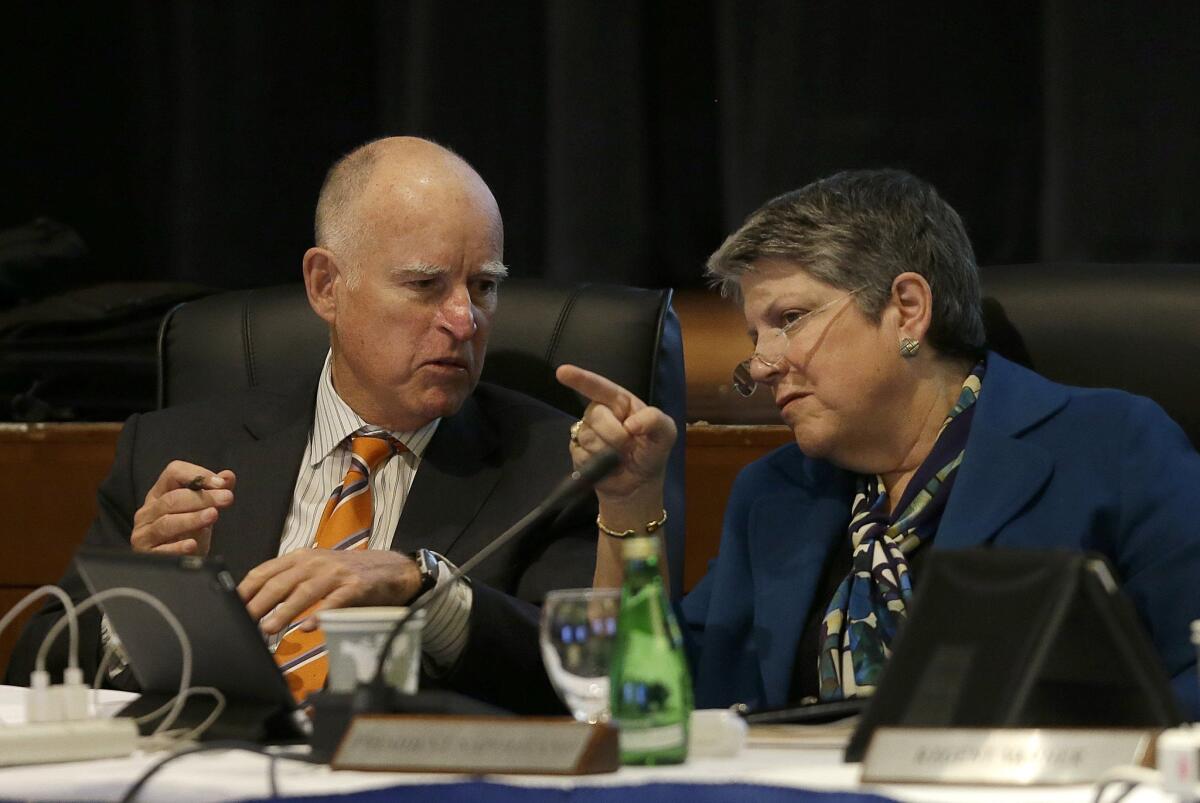UC regents endorse Brown’s funding plan, but look to lawmakers for more

Gov.
The UC regents, in a meeting marked by feelings of relief and uncertainty, on Thursday embraced Gov. Jerry Brown’s budget proposal, which would significantly boost university funding, freeze in-state undergraduate tuition for two years, and require the 10-campus system to reform its pension plan and increase the number of transfer students it enrolls.
But with no money in the plan to expand in-state undergraduate enrollment, officials said, they would be pressing lawmakers for extra funding.
The board voted unanimously for the plan that Brown and UC President Janet Napolitano announced last week, after months of disagreement and bargaining. UC previously had sought to raise the current annual undergraduate tuition of $12,200 — not including room and board — by as much as 5% in each of the next five years, but Brown was strenuously opposed.
Regent Sherry Lansing noted that the mood at the university had been “unbelievably gloomy” during the disagreement with the governor and the student protests over impending tuition increases. With a proposed additional $486 million in state funding over the next three years, Lansing said, it seemed like a new era. Napolitano and Brown deserved “bravo and congratulations,” Lansing said.
But the lack of enrollment funds is “a gaping hole” in the agreement, said Monica Lozano, who was elected Thursday as the regents’ chairwoman for the upcoming year. UC officials’ goal is to add 6,800 in-state undergraduates to the current 169,000 over the next four years.
The budget is scheduled to be finalized next month.
In addition, student leaders Thursday said they were upset that out-of-state undergraduates will face 5% tuition increases, to about $36,900 next year, and further hikes in later years. Plus graduate students — from California and elsewhere — in about 50 professional programs such as medicine and business administration will see increases that vary by campus and discipline.
Christopher Kan, a student advisor to the regents’ finance committee, said he was worried that students from other states and nations might be priced out of UC in the future, resulting in “more homogeneous” campuses. UC students need to be exposed to “diversity of thought and experience,” said Kan, who is a graduate student in evolutionary biology at UC Santa Cruz.
All undergraduates have had their tuition frozen for the last three years. That would be extended for Californians under the Brown proposal until the 2017-18 school year, when their tuition would increase by the general inflation rate — with a 5% annual maximum.
Beyond tuition, the regents endorsed the governor’s plan to cap pension benefits for future UC employees; increase the number of transfer students, expand summer schools, add more online classes, and make it easier for some students to graduate in three years.
Napolitano said she and the governor “stood united in our conviction that this is the time for the state to begin to re-invest in earnest in UC.” Brown, who is a regent and has been at many meetings in the last year, did not attend Thursday.
Brown’s budget calls for 4% increases in state general revenue funding to UC in each of the next four years, for a total of $507 million. In the most significant addition, UC would get $436 million over three years from the state’s rainy day fund to pay pension obligations. Brown also has proposed giving UC $50 million for deferred maintenance and energy efficiency projects.
The regents Thursday also heard an emotional plea that the university system stop investing in the gun industry.
Bob Weiss of Westlake Village, whose daughter Veronika was among six UC Santa Barbara students killed during a rampage in Isla Vista a year ago, broke down as he urged divestment from any weapons firms.
UC officials said they had sold off what were relatively small direct and indirect holdings in firms that manufacture or distribute guns after the 2012 killings of children and staff at a Connecticut elementary school. But UC is reexamining its investments, spokeswoman Dianne Klein said, and will sell them off if they are found to include any gun-related firms.
Twitter: @larrygordonlat
More to Read
Start your day right
Sign up for Essential California for news, features and recommendations from the L.A. Times and beyond in your inbox six days a week.
You may occasionally receive promotional content from the Los Angeles Times.







